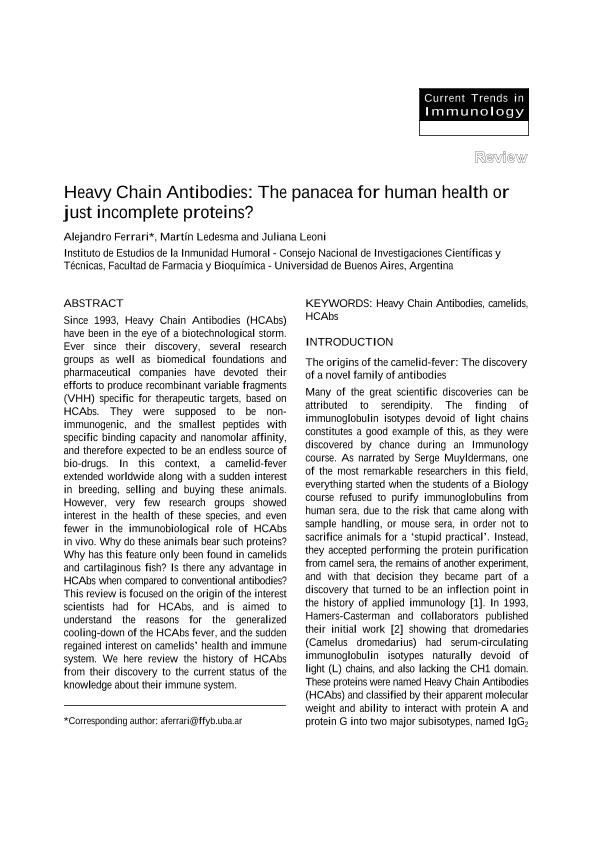Mostrar el registro sencillo del ítem
dc.contributor.author
Ferrari, Alejandro

dc.contributor.author
Ledesma, Martin Manuel

dc.contributor.author
Leoni, Juliana

dc.date.available
2016-07-18T19:13:55Z
dc.date.issued
2013-06
dc.identifier.citation
Ferrari, Alejandro; Ledesma, Martin Manuel; Leoni, Juliana; Heavy Chain Antibodies: The panacea for human health or just incomplete proteins?; Research Trends; Current Trends in Immunology; 14; 6-2013; 23-33
dc.identifier.issn
0972-4567
dc.identifier.uri
http://hdl.handle.net/11336/6574
dc.description.abstract
Since 1993, Heavy Chain Antibodies (HCAbs) have been in the eye of a biotechnological storm. Ever since their discovery, several research groups as well as biomedical foundations and pharmaceutical companies have devoted their efforts to produce recombinant variable fragments (VHH) specific for therapeutic targets, based on HCAbs. They were supposed to be nonimmunogenic, and the smallest peptides with specific binding capacity and nanomolar affinity, and therefore expected to be an endless source of bio-drugs. In this context, a camelid-fever extended worldwide along with a sudden interest in breeding, selling and buying these animals. However, very few research groups showed interest in the health of these species, and even fewer in the immunobiological role of HCAbs in vivo. Why do these animals bear such proteins? Why has this feature only been found in camelids and cartilaginous fish? Is there any advantage in HCAbs when compared to conventional antibodies? This review is focused on the origin of the interest scientists had for HCAbs, and is aimed to understand the reasons for the generalized cooling-down of the HCAbs fever, and the sudden regained interest on camelids? health and immune system. We here review the history of HCAbs from their discovery to the current status of the knowledge about their immune system. Heavy Chain Antibodies: The panacea for human health or just incomplete proteins?
dc.format
application/pdf
dc.language.iso
eng
dc.publisher
Research Trends
dc.rights
info:eu-repo/semantics/openAccess
dc.rights.uri
https://creativecommons.org/licenses/by-nc-sa/2.5/ar/
dc.subject
Heavy Chain
dc.subject
Antibodies
dc.subject
Polyclonal
dc.subject
Camelids
dc.subject.classification
Ciencias Veterinarias

dc.subject.classification
Ciencias Veterinarias

dc.subject.classification
CIENCIAS AGRÍCOLAS

dc.title
Heavy Chain Antibodies: The panacea for human health or just incomplete proteins?
dc.type
info:eu-repo/semantics/article
dc.type
info:ar-repo/semantics/artículo
dc.type
info:eu-repo/semantics/publishedVersion
dc.date.updated
2016-02-29T17:58:39Z
dc.journal.volume
14
dc.journal.pagination
23-33
dc.journal.pais
India

dc.description.fil
Fil: Ferrari, Alejandro. Consejo Nacional de Investigaciones Cientificas y Tecnicas. Oficina de Coordinacion Administrativa Houssay. Instituto de Estudios de la Inmunidad Humoral "Profesor R. A. Margni"; Argentina
dc.description.fil
Fil: Ledesma, Martin Manuel. Consejo Nacional de Investigaciones Cientificas y Tecnicas. Oficina de Coordinacion Administrativa Houssay. Instituto de Estudios de la Inmunidad Humoral "Profesor R. A. Margni"; Argentina
dc.description.fil
Fil: Leoni, Juliana. Consejo Nacional de Investigaciones Cientificas y Tecnicas. Oficina de Coordinacion Administrativa Houssay. Instituto de Estudios de la Inmunidad Humoral "Profesor R. A. Margni"; Argentina
dc.journal.title
Current Trends in Immunology
dc.relation.alternativeid
info:eu-repo/semantics/altIdentifier/url/http://www.researchtrends.net/tia/abstract.asp?in=0&vn=14&tid=36&aid=4288&pub=2013&type=3
Archivos asociados
